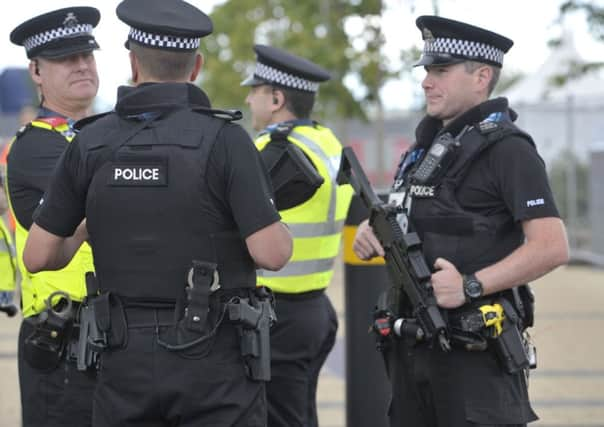Police Scotland in new row over gun patrols


Giving evidence to the Scottish Parliament’s policing committee yesterday, Assistant Chief Constable Bernard Higgins said officers in armed response vehicles (ARVs) had gone to 1,644 incidents since October, including missing person searches and dangerous driving incidents.
That is despite a climbdown by Police Scotland the same month in which the force pledged only to send gun-carrying officers to armed incidents or those where there was a “threat to life”.
Advertisement
Hide AdAdvertisement
Hide AdUnder questioning from MSPs, Mr Higgins said ARVs had been dispatched to five incidents since October which did not meet the “absolute criteria” of an armed incident or one where there was a threat to life.
But without being directed by their control rooms, armed officers also went to a further 1,644 incidents, where they “pro-actively engaged with members of the public”, Mr Higgins said.
These included incidents of dangerous driving, drink driving and missing persons, he said.
Amid growing controversy over armed policing, Chief Constable Sir Stephen House said on 1 October that firearms officers would only be “deployed to firearms incidents or where there is a threat to life”.
But giving evidence at Holyrood yesterday, Mr Higgins said he would expect armed officers to continue responding to incidents unfolding nearby.
He said: “Deployed on routine duties since October, there have been five occasions where ARVs were dispatched to calls which didn’t fit the absolute criteria of a firearms incident.
“In three of the five incidents that were identified, I personally believe they do reflect a threat to life because they refer to personal attack alarms activations by victims of domestic abuse.”
He added: “Since 1 October, armed response officers have involved themselves in 1,644 instances where they have pro-actively engaged with members of the public.
Advertisement
Hide AdAdvertisement
Hide Ad“That will include charging people with offences which included dangerous driving, drink-driving and other such like offences.”
Liberal Democrat justice spokeswoman Alison McInnes said this was “quite a different story” from information MSPs had been given previously.
“The assurances that we have had that police officers are not out on routine issues is given a lie by these figures – 1,644 incidents where police officers carrying arms are interacting with citizens in a situation that is not life-threatening,” she said.
Mr Higgins said: “In year one of Police Scotland, that figure was over 30,000 so I think there has been a huge reduction.”
Ms McInnes said: “We have been given an assurance by Police Scotland that this is not happening, and it clearly is happening whether it is on a reduced scale or not.”
Mr Higgins said: “With respect, from October the message that we have consistently said in Police Scotland is that the ARVs will deal with firearms operations, threat to life and use professional judgment over anything else that they come across.
“In 1,644 times they have come across instances where their professional judgment has determined that they should take action.”
Mr Higgins said there were currently 268 officers attached to ARVs and he said he expected those officers to confront crime where they saw it.
Advertisement
Hide AdAdvertisement
Hide Ad“They are still police officers,” he told the committee. “If they see crime happening in front of them, my expectation is that they would deal with that crime.”
Asked about whether there was a reticence to do that since October, he said: “I don’t believe there is.”
Speaking after the meeting, Ms McInnes said: “Once again the whole truth had to be coaxed out of senior officers.
“Only my repeated questioning caused them to reveal armed officers have intervened in non-firearms incidents and situations where there is no threat to life on 1,644 occasions since 1 October 2014.
“Despite the fact this has been one of its most controversial policies, Police Scotland has again chosen not to be wholly upfront with either parliament or the Scottish Police Authority (SPA) to which they are accountable. Senior officers seem to operate on a need-to-know basis which is limited to their own ranks.”
Labour MSP Graeme Pearson, a former senior police officer, said: “We would not want to hamper officers making individual assessments.
“My concern is that there is a risk to the public and to officers of them making a choice in the heat of the moment without any oversight.
“What’s not been dealt with by HMICS [Her Majesty’s Inspectorate of Constabulary in Scotland] and the SPA is who has the authority to make these decisions [about armed policing]. Was that decision the chief constable’s to take in the first place? My position from the start has always been that it wasn’t.”
Advertisement
Hide AdAdvertisement
Hide AdYesterday’s row followed the recent controversy over stop and search, whereby officers were found to be continuing to search children under the age of 12, despite assurances given to MSPs that the tactic had stopped.
A Police Scotland spokesman said: “Our policy hasn’t changed. We’re adhering to the revised deployment criteria announced in October.”
FOLLOW US
SCOTSMAN TABLET AND MOBILE APPS